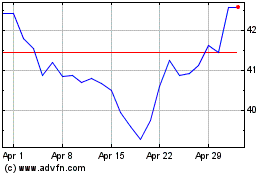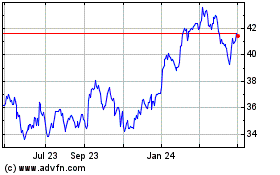Brexit Surprise: A Loss and Gain For U.K.'s Glaxo -- WSJ
July 28 2016 - 3:03AM
Dow Jones News
By Denise Roland
LONDON -- While Brexit provided an expected boost to core
earnings for GlaxoSmithKline PLC, it also led to a big write-down
-- the latest in a series of surprises stemming from Britain's vote
to leave the European Union.
The U.K.-based drug giant said it recorded a GBP1.8 billion
pound ($2.4 billion) charge to earnings, resulting in a net loss
for the second quarter. The charge came after the company revalued
its liabilities in line with the steeply lower pound. Sterling fell
sharply after the Brexit vote last month and hasn't recovered
much.
Investors and analysts shrugged off the big charge and net loss,
with the stock finishing up 1.8% in London. They had been expecting
the lower pound to sharply boost the company's so-called core
earnings, which strip out one-time items. It did -- increasing core
earnings by 21 percentage points for the second quarter. Revenue
rose seven percentage points.
Glaxo also narrowed its earnings guidance for the full year to
the upper end of its previous range.
The company separately said it would invest GBP275 million to
increase capacity at three of its U.K. factories, which Chief
Executive Andrew Witty said was a vote of confidence in the face of
the Brexit vote.
Mr. Witty said Wednesday that going forward the company was
"reasonably insulated" from any Brexit fallout. He said his U.K.
investment decision, taken after the June 23 referendum, was a sign
that Glaxo believed Britain was just as competitive today as it was
before the vote.
The big charge was the latest in a series of unexpected Brexit
consequences that have roiled boardrooms. Most have stemmed from
the steep slide in sterling.
Earlier this week, Anheuser-Busch InBev NV boosted its offer for
SABMiller PLC in their $100-billion-plus proposed beer megamerger.
The move was an attempt to quell some angry investors who say pound
weakness has made the deal less attractive. It came after the two
have spent months trying to win regulatory approval around the
world, agreeing to sell off big chunks of their businesses in the
process.
Shares have soared for companies like Glaxo, which report in
sterling but derive most of their sales in other currencies. After
the steep fall in the pound, analysts have been expecting a big
currency tailwind in profit for these firms, as those overseas
sales translated into more pounds than they would have before the
vote.
Glaxo's core operating profit, boosted by the currency tailwind,
increased 36% to GBP1.8 billion. Revenue climbed 11% to GBP6.5
billion, beating analyst forecasts of GBP1.6 billion and GBP6.3
billion, respectively. Adjusting for currency effects, core
operating profit climbed 15%, and revenue rose 4%.
But the falling pound also increases the value of Glaxo's
liabilities, forcing the company to take the GBP1.8 billion
write-down and post a net loss of GBP435 million for the three
months to June 30. That compared with a GBP149 million net profit
reported a year earlier.
Those liabilities include a put option held by Novartis AG
giving the Swiss drug giant the right to sell its stake in the
pair's jointly owned consumer-health-care business to Glaxo. With a
weaker pound, that stake is worth more, so it would cost Glaxo more
to acquire.
Glaxo also narrowed its full-year guidance to the upper end of
earlier estimates. It now expects core earnings per share to
increase 11% to 12% in 2016, compared with 10% to 12%
previously.
Write to Denise Roland at Denise.Roland@wsj.com
(END) Dow Jones Newswires
July 28, 2016 02:48 ET (06:48 GMT)
Copyright (c) 2016 Dow Jones & Company, Inc.
GSK (NYSE:GSK)
Historical Stock Chart
From Mar 2024 to Apr 2024

GSK (NYSE:GSK)
Historical Stock Chart
From Apr 2023 to Apr 2024
